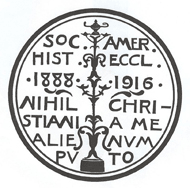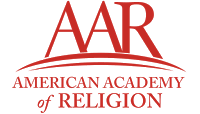| Online: | |
| Visits: | |
| Stories: |

| Story Views | |
| Now: | |
| Last Hour: | |
| Last 24 Hours: | |
| Total: | |
A Shakeup in the Guilds
Elesha Coffman
As I wrote back in January and April, the American Society of Church History is reevaluating its longstanding relationship with the American Historical Association. Because of administrative changes at the AHA, holding the ASCH annual meeting in conjunction with the AHA annual meeting has become more expensive and logistically challenging. The ASCH is in the process of surveying its members and other interested parties (watch this space!), and there will be an extraordinary business meeting in Atlanta in January to discuss future conferences. It's very important to those of us on the ASCH council to gather feedback and make careful, prudent decisions.
Meanwhile, our cousins at the American Academy of Religion are doing their own soul-searching as a result of the society's vice-presidential election. This year, both candidates for VP are Christian theologians, David Gushee at Mercer University and Kendall Soulen at Wesley Theological Seminary. Because the AAR VP goes on to become the president-elect and then the society's president, whoever wins this election will have a leadership role in the organization for the next few years.
Some AAR members have reacted strongly against this slate of VP candidates. Aaron W. Hughes of the University of Rochester boycotted the election and explained why in an open letter to AAR members. Michael J. Altman of the University of Alabama also refused to cast a vote, writing on his blog, “For members of the AAR who, like myself, do not do theological work, who do not engage in constructive work within a religious tradition, who approach religion as a social/historical/cultural/discursive construction, and who work within state universities, there is no representative candidate. I am not a theologian.”
Because one of the options for ASCH would be to meet in conjunction with AAR instead of AHA, I'm watching this saga with a fair amount of interest. I have to say, AAR's looking pretty inhospitable right now.
I don't know whether the following statements are representative of the AAR membership, but they certainly give me pause. Hughes's open letter includes the lines, “Both candidates are Christian ethicists/theologians. While colleagues tell me that at least one of them is a 'progressive evangelical,' I remain uncomfortable with the choices put before us.” It would seem, then, that Hughes is not only worried about the VP candidates' methodology but also about the content of their theology, specifically whether that theology is sufficiently liberal (or at least not un-progressive evangelical). Many of my fellow ASCH members would fail that ideological litmus test and, frankly, be offended by it.
Altman delivers an even sharper jab: “That many AAR members would consider a Baptist minister and theologian [Gushee] their subject of study rather than their conversation partner doesn't seem to strike either candidate as a problem.” I'm pretty sure that ASCH members would rather be treated as scholars than as specimens at their annual meeting, and if AAR members would be unable to extend them that courtesy, then the AAR isn't nearly as big a tent as it fancies itself to be.
No decision has been made about ASCH annual meetings, and none will be made until after January. Affiliation with AAR is still, at this point, a possibility, and if ASCH goes that way I will make my peace with it. At least AAR has better receptions. The sting of having my scholarship and my institution sneered at might be eased by a few free drinks.
A Group Blog on American Religious History and Culture
Source: http://usreligion.blogspot.com/2015/10/a-shakeup-in-guilds.html





